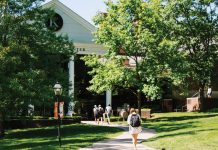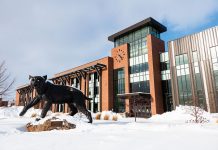As people in some 190 nations observe Earth Day for the 53rd time on April 22, among us there are individuals who carry that torch in West Michigan all year long.
Three local chapters of the National Audubon Society are working to improve and preserve lakeshore habitat areas.
The grassroots group GoSolar! holds monthly online sessions so newbies can hear from those who’ve done it.
Local members of the nationwide Citizens’ Climate Lobby work locally and visit Washington, D.C. yearly to make the case for fee and dividend legislation, a fossil fuel reduction strategy members believe has the best chance of reining in climate change.
Representatives of these lakeshore organizations will be at the Earth Day Lakeshore Celebration in Grand Haven on April 29 to encourage others to join them in local projects and advocacy. The yearly event (which is not on Earth Day) was started by a group that got together to oppose a proposed development in 2002. The event starts with a march to boost awareness of environmental concerns. A fair that follows at Central Park Place community center, 421 Columbus Ave., will feature information tables, music, food, and activities for kids. “We’re doing it the week after (Earth Day) because it would be in competition on the 22nd with everyone else who’s earth conscious,” said Ginger Aubrey of West Olive, one of the organizers.

Internationally, Earth Day’s talking points this year include planting trees, stepping back from single-use plastics, and fighting “fast fashion” garments so cheap that they quickly pile up in landfills.
Locally, talking points include very local concerns. Harbor Island, west of the drawbridge in Grand Haven, is on the radar of Audubon Society members including Beth Miller, who’s involved in two chapters where Muskegon and Ottawa counties meet. In 2020, the coal-fired power plant on Harbor Island was dismantled. A year later, community opposition led the city to set aside plans for a new gas-fired plant. What will happen after contaminants are dealt with is up in the air. Harbor Island is “a birding magnet, especially during migration,” Miller said. “We’re hoping to get a seat at the table to have an influence on what happens.”
Leslie Newman of Spring Lake, who’s part of the Earth Day celebration group and another called Wetlands Watch, is concerned about phragmites on Harbor Island, too — invasive plants that could destroy Grand River island habitats for wildlife such as ducks and deer. “They’re brilliant plants; they have a poison that will not let anything else grow,” she said.
Retired folks do a lot of the heavy lifting for some of the lakeshore’s grassroots environmental groups. Young people also are concerned. Various programs nurture their involvement, such as the VoLes volunteer program for 12- to 18-year-olds at the Outdoor Discovery Center south of Holland. Hope College’s Office of Sustainability has a dozen student interns engaged in various efforts on campus and with groups in the Holland community. “Holland is a really great size for collaboration: big enough to get a lot of things done, but small enough that people know each other,” said Michelle Gibbs, who directs that office.
Ottawa County’s Careerline Tech Center Environmental Field Studies program combines coursework with student placements in environmental and agricultural firms and agencies. Many of its graduates are pursuing careers or degrees in environmental science, forestry, and wildlife and fisheries — from studying forestry in the Upper Peninsula to working on a sustainable farm in Africa. Eighteen students from Ottawa County are enrolled this year, including teens from Grand Haven, Zeeland and Holland.
“Climate change is a theme throughout most of the year — it has such far-reaching implications and affects nearly every aspect of environmental science,” said Field Studies instructor Avril Wiers of Zeeland. “This year, we’ve partnered with Tulip Time to make a sustainability plan moving forward.” Students also monitor water quality on the Pigeon River and visit Port Sheldon Natural Area regularly for “stewardship days.”
“By reconnecting students with nature, I hope they’ll be motivated to take action to preserve our planet for the future,” Wiers said.








Facebook Comments